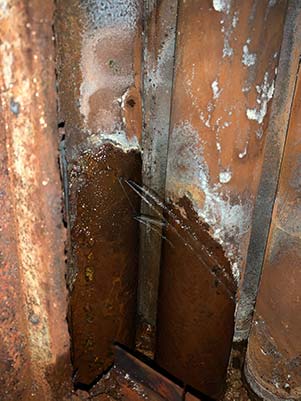When it comes to boiler maintenance, you may be focused on major problems like component failures or system breakdowns. You must also be on the lookout for boiler corrosion, a less obvious but very serious problem that can rapidly develop into catastrophic failure of your boiler.
Boiler corrosion happens when any iron that is present in the boiler system is exposed to oxygen and water. This combination causes a chemical reaction that ultimately leads to the formation of rust and disintegration of the metal in the boiler tubes and related pressure parts.
How Boiler Corrosion Happens
Pitting corrosion occurs in a localized point and can be highly destructive. A local anodic or cathodic point serves as the starting point for a pit or patch of corrosion. Oxygen in the boiler water supply can be the catalyst for this corrosion. When pitting is observed, it is important to check that ancillary equipment such as deaerators, feedwater tanks, and chemical pumps are operating properly and that no leaks have developed allowing fresh water or process contaminants into the system.
Crevice corrosion can form near cracks if poor water circulation prevents the rinsing of caustic elements from the boiler surfaces. This is more common in large water tube style boilers.
Another type of boiler corrosion can occur on the metal near a joint. Referred to as galvanic corrosion, this corrosion happens when metals that are electrochemically dissimilar are in electrical contact in an electrolytic environment. This type of corrosion is more commonly found in hydronic systems with dissimilar metals in the boiler heat exchanger and piping. A dielectric joint or other type of protective measure can be used to prevent this type of degradation.
Corrosion can also happen in a boiler when the pH of the water is too high or too low. Caustic corrosive damage occurs when a concentrated caustic agent dissolves and creates high pH. Acidic corrosion develops when the boiler water pH is too low. Improperly managed cleaning chemicals can also lead to acidic corrosion.
How to Keep Boiler Corrosion Under Control
While it is not possible to prevent boiler corrosion entirely, it is possible and important to manage conditions that encourage it. A proactive approach to stopping the spread of corrosion will maximize the service life of your boiler.
A regular program of boiler inspection will help you monitor the operation of both the boiler and its ancillary equipment. Watch for things like changes in the water pH and the temperature of the water in the feed tank. Regularly check the system for leaks and inspect for any signs of corrosive damage. Boiler water, feed water, make-up water, and condensate should be checked daily for pH levels, hardness, and chemical levels. Trending these values over time can give you an early warning on problems. A contract with a reputable and experienced chemical treatment company can take the burden of monitoring off of your maintenance staff.
Proper removal of gasses with a deaerator or feed water tank coupled with proper chemical treatment can resolve most issues. Regularly scheduled boiler service will provide the opportunity to keep your boiler clean and clear of rust, corrosion, and scale, while giving you a heads up on potential problems.
Ready to learn more about optimizing boiler performance? Contact the experts at Lathrop Trotter.
Questions? Your Lathrop Trotter sales engineer can help! Contact Us



